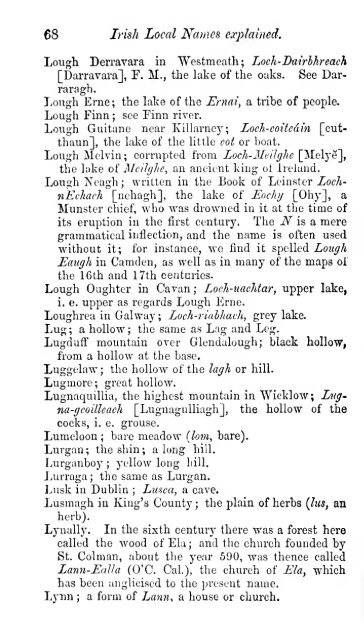Irish local names explained
Irish local names explained
Irish local names explained
You also want an ePaper? Increase the reach of your titles
YUMPU automatically turns print PDFs into web optimized ePapers that Google loves.
68 <strong>Irish</strong> Local Names <strong>explained</strong>.<br />
Lough Derravara in Westmeath; Loch-Duirlhreach<br />
[Darravara], F. M., the lake of the oaks. See Darraragh.<br />
Lough Erne; the lake of the Ernai, a tribe of people.<br />
Lough Finn ;<br />
see Finn river.<br />
Lough Guitane near Killarnej^; Loch-coitedin [cutthaun],<br />
the lake of the little cot or boat.<br />
Lough Melvin ; corrupted from Loch-Meilghe [Melye],<br />
the hike of Mcihjhe, an ancient king of Ireland.<br />
Lough Neagh ; written in the Book of Leinster LochnEchach<br />
[nehagh], the lake of Eochij [Ohy], a<br />
Munster chief, who was drowned in it at the time of<br />
its eruption in the first century. The iV is a mere<br />
grammatical inflection, and the name is often used<br />
without it; for instance, we find it spelled Lough<br />
Eaiigh in Camden, as well as in many of the maps ol<br />
the 16th and 17th centuries.<br />
Lough Oughter in Cavan ; Loch-uachtar, upper lake,<br />
i. e. upper as regards Lough Erne.<br />
Loughrea in Galway ; Loch-riahhach, grey lake.<br />
Lug; a hollow; the same as Lag and Leg.<br />
Lugduff mountain over Glendalough; black hollow,<br />
from a hollow at the base.<br />
Luggelaw ; the hollow of the lagh or hill.<br />
Lugraore; great hollow.<br />
Lugnaquillia, the highest mountain in Wicklow; Lugna-gcoilleach<br />
[LugnaguUiagh], the hollow of the<br />
cocks, i. e. grouse.<br />
Lumcloon ; bare meadow (lorn, bare).<br />
Lurgan ; the shin ; a long hill.<br />
Lurganboy ; 5'ellow long hill.<br />
Lurraga ; the same as Lurgan.<br />
Lusk in Dublin ; Lusca, a cave.<br />
Lusmagh in King's County; the plain of herbs {lus, an<br />
herb).<br />
Lynally. In the sixth century there was a forest here<br />
called the wood of Ela ; and the church founded by<br />
St. Colman, about the year 590, was thence called<br />
Lann-Ealla (O'C. Cal.), the church of Ela, which<br />
has been anglicised to the present name.<br />
LyTin ; a form of Lann, a house or church.

















